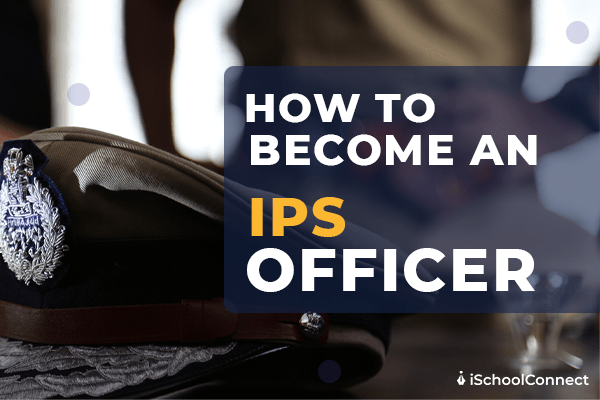Table of Contents
Becoming an IPS Officer | An overview
The Indian Police Service (IPS) was established under Article number 312 of the Indian constitution. A year after India’s independence, the IPS replaced the system and organizational functioning of the Indian (Imperial) Police. To date, a career as an IPS officer continues to be respected for the significance it holds to society since the country’s independence.
The IPS is one of the three departments of the All India Services of the Government of India. The First Police Commission (appointed in 1865) described an IPS officer’s responsibilities, including maintaining order, enforcement of all laws, and detecting & preventing crime.
If you are considering a career as an IPS officer, here are the steps you should take to fulfill this dream.
Steps to becoming an IPS officer
The IPS is not a typical police force. It is a pool of specially trained senior officers for the different arms of the police force. This employment usually occurs at the Central, State, and International levels! Before you begin the process of becoming an IPS officer, it is important to establish what your professional goals and expectations are.
Apply for the CSE exam conducted by the UPSC

accessing the online portal hosted on the UPSC’s website.
- To become an IPS officer, your first step includes appearing for the annual UPSC exam.
- This national-level exam is difficult to crack. The exam covers three stages – Preliminary, Mains, and Interview.
- You will qualify for the position of an IPS officer only after clearing all three stages of this exam.
Make a note of the eligibility criteria to fill out the application form for this exam. These include-
- You should be 21 years of age or above. The maximum eligible age for the role of an IPS officer is 32 years.
- You should hold an Indian citizenship certificate that can be verified during the selection process.
- You must be a graduate with a certificate from a recognized educational authority.
Complete your undergraduate from a related field of the UPSC syllabus
- After the completion of your 10+2 examination, you can opt to pursue a degree in science, arts, commerce, or any other field in preparation for a career as an IPS officer.
- However, you will gain a significant competitive advantage if you opt to pursue your undergraduate studies with subjects that are a part of the UPSC syllabus. These subjects include –
- Economics
- Geography
- History
- Political Science
- Science
- While pursuing your undergraduate degree, consider pursuing optional subjects to add more skills to your application for an IPS officer position. For example, you can pursue online courses related to international relations, world history, disaster management, cybersecurity, and environmental studies.
Understand the paper pattern
- Doing thorough research and understanding the paper pattern of the exam can help you streamline your preparation process.
- With information on all aspects of the exam, you will be able to train accordingly and put your best foot forward on an official day.
- The Preliminary exam has two types of papers. Each paper has an MCQ-based pattern and is as follows –
- Civil Services Aptitude Test (CSAT)
- General Science
- Each paper contains a total of 100 MCQs, which are two marks each. The questions include a wide range of subjects, including current affairs, sports, and academics.
- On the other hand, the Mains exam is divided into 4 general science papers, each carrying a total of 250 marks. You will have to choose an essay paper and an English paper that will tally up to a total of 300 marks.
- The final interview is worth a total of 275 marks. The purpose of this round is to assess an individual’s personality & temperament. The final qualifying score calculates by adding marks obtained in the interview and the marks obtained in the written exam.
Work on your physical fitness
- An important part of being an IPS officer is that you must engage in physically-demanding activities regularly.
- Creating a structured and customized training program for yourself is essential to begin your preparations.
- Consider maintaining a healthy, nutritious, and well-balanced diet interspersed with physical activities to stay fit and build stamina.
Stay focused and give every stage your best effort

- Creating a structured routine for exam preparation is crucial to clearing the first two rounds of becoming an IPS officer.
- However, you should also invest significant time and effort into developing your personality, physical fitness, and awareness of current affairs.
- Stay motivated and dedicated by remembering your final objective. While it can be easy to get distracted or disheartened, keeping your cool and giving each stage your 100% can work wonders!
Key takeaways
- The position of an IPS officer is recognized as one of the most important and prestigious positions in the All India Services of the Government of India.
- Following the above-listed steps can be an excellent way to initiate the process of becoming an IPS officer.
- Learning every important aspect of the exam pattern can help you align your academic efforts towards clearing the same.
- It is important to remain motivated and consistent in your efforts to see the best results for your hard work and sincerity.
We hope this blog on becoming an IPS Officer helps you sail through this journey. If you have any questions/suggestions, drop a comment below or reach out to us. We would be happy to assist you with your queries!
Liked this blog? Read next: Forensic Psychology | Top 10 facts you must know!
FAQs
Q1. Where do IPS officers undergo probationary training?
Answer – IPS officers undergo probationary training at Sardar Vallabhbhai Patel National Police Academy (Hyderabad) and Lal Bahadur Shastri National Academy of Administration (Mussoorie).
Q2. Which are the different organizations where an IPS officer can be appointed?
Answer – An IPS officer can be appointed by autonomous organizations, subordinate organizations, UN organizations, and international organizations. The final employment depends on the associated responsibilities.
Q3. Do IPS officers receive promotions during their careers?
Answer – Yes, they do. Promotions generally take place after the thorough evaluation of performance based on vigilance clearance, annual performance appraisal reports, and scrutiny of other government documents.






